Jeff Jarvis's Blog, page 2
September 19, 2024
How they have failed us

It is as if the editorial department at The Washington Post woke up one morning asking, in headlines I will quote below, “What are we doing wrong?”
I will start by trying to answer the question for them, The New York Times, CNN, and the rest of incumbent journalism:
You have refused to recognize fascism at the door. You insist on covering authoritarianism as just another side in still-symmetrical American politics.
You do not read history. For God’s sake, reread or read Hannah Arendt’s The Origins of Totalitarianism (or at least listen to the podcast). You fail to cite history for your readers, explaining the context of what is occurring, because you insist on thinking you are writing your “first draft of history.” What hubris.
You think, as is often said, that our problem is disinformation and since you are in the information business, you must be the solution. Arendt teaches instead that “totalitarian government … bases itself on loneliness, on the experience of not belonging to the world at all, which is among the most radical and desperate experiences of man.” By this, she does not mean the insipid “loneliness epidemic” you and the Surgeon General prattle on about: incels unable to get laid. She means isolating people from their communities through unfounded fear, making them vulnerable to the siren call of race hatred. That is Springfield.
You let yourselves be exploited by these malign forces to spread their bigotry and bile, cushioned with your white-gloved euphemisms and sane-washing. You do not explain blood libel to your readers. Is that because you do not recognize it yourself?
You quote their noxious words, taking them at face value — as beliefs, as “alternative facts” — unable to see how they are instead saying these things to signal their belonging to the cult and cause. The call-and-response of Trump and Vance and their mob is the authoritarian ruler’s loyalty test. Arendt observed in Nazi Germany and the Stalinist Soviet Union “such unexpected and unpredicted phenomena as the radical loss of self-interest, the cynical or bored indifference in the face of death or other personal catastrophes, the passionate inclination toward the most abstract notions as guides for life, and the general contempt for even the most obvious rules of common sense.” Guns, abortion, immigration, and trans rights cannot be the central guideposts in the everyday lives of these people; they are flags to fly. In your quotation and coverage, you salute them.
You hide behind your impotent fact-checking, never seeing — though frequently warned — that in the ways you debunk their lies, you spread them, and by pedantically nitpicking the other side in your misguided search for balance you create false equivalence. This is how they exploit you.
You thus lie to yourselves and the public you serve by refusing to call lies lies, racism racism, misogyny misogyny, authoritarianism authoritarianism, fascism fascism.
Before I examine your all-too-recent efforts to understand what you are doing wrong, let me offer two counter examples of wise journalism.
When Russia invaded Ukraine, the Helsingen Sanomat, reporting to a nation vitally concerned about the aggression of its neighbor, quoted historians atop its home page to provide context. You should be reaching out to historians, anthropologists, sociologists, and scholars who study ethics, media studies, communication, and rhetoric to explain to you and the public what is occurring. You are not yourself expert.
When Trump and Vance’s hate directed at Haitians in Springfield became memes, The Times’ Jamelle Bouie took to TikTok to explain — as he often does there — what is actually happening. Please take two minutes and forty-two seconds to watch.
I am glad to see the Post’s columnists begin self-reflection on their — and my — field’s coverage of this time. Here, Matt Bai recognizes how ineffectual modifiers are in front of Trump’s lies. That seems a good start.
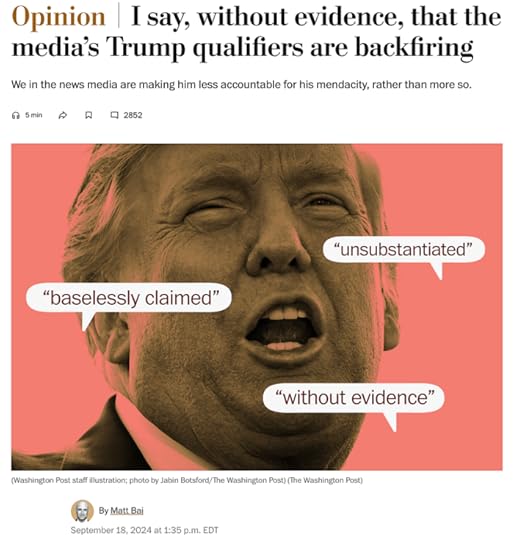
“And by now,” Bai writes, “it seems tragically obvious to me that, by constantly holding Trump to a different standard of proof than we do anyone else, we in the news media are actually making him less accountable for his mendacity, rather than more so….
“Here’s the dilemma. The news media can’t credulously publish things we know to be untrue — and yet, if the president says them, we can’t exactly not publish them, either. At the same time, we find ourselves pressured by critics on social media for whom no level of scrutiny, when it comes to Trump, will ever be enough.”
Bai’s odd argument is that because Trump is a pathological liar, he is held to a different standard of truth, and journalists are expected — by “a bunch of preening media critics” — to subject him to “this policy of hyper-skepticism,” demanding that he provide evidence, for example, in blaming Democrats for assassination attempts against him. Bai asks: “Must a candidate walk around all day with an armful of data to back up every assertion? Is there really no room to advance a controversial and speculative argument without producing slides to support it?”
So he begins by reflecting on the ineffectiveness of journalism’s strategy of adjectival caveats to hateful lies but ends by justifying Trump’s incendiary assertion that Democrats’ assertion that he is a threat to democracy is what is incendiary. He argues that “our need to append qualifiers to everything he says is making us look like we’re out to discredit him. In other words, we appear to be proving Trump’s entire point not just about the news media but about the nation’s elite institutions as a whole. Rather than reinforcing trust in news coverage, I fear we’re further eroding it.”
So what then? Let him skate? Or — here comes the predictable journalistic reflex — do unto Harris as is done unto Trump. Bai tries to apply the same level of scrutiny to Harris and Biden, ending up in just one more journalistic exercise in bothsidesing.
Sigh.
Next, here is Catherine Rampell positing her theory of what she calls idiotception, “a self-perpetuating, IQ-destroying cycle: Politicians hear or invent a stupid lie, which they plant in the minds of their followers. Their followers then repeat that stupid lie back to those same politicians. Then, the politicians insist they have no choice but to act on the stupid lie. After all, the public demands it!”
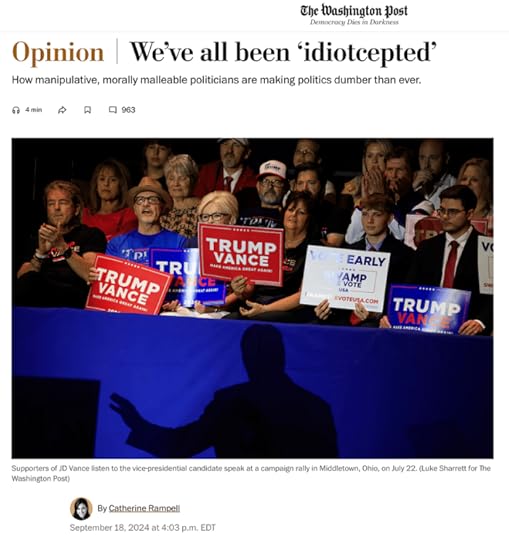
She tracks the Springfield lie, free of context, not recognizing what is underneath it: the blood libel Bouie identifies and explains. Then, just like her colleague, her knees jerk and she, too, ends up bothsidesing: “To be clear, the idiotception cycle is not unique to Republican politicians, even if they’ve been particularly aggressive adopters.”
This is the same Post columnist who, before Harris announced her economic policies, accused her of being a communist price fixer and, when that turned out to be false, refused to correct herself and called Harris’ actual policy “silly.”
Rampell concludes: “Dumb, baseless stories floated by randos have always had the ability to gain followers. But in today’s media environment, they can spread and strengthen astonishingly quickly, particularly when they serve the agendas of manipulative, morally malleable politicians.” And columnists.
Growl.
The Post doesn’t fact-check its columnists, but it certainly fact-checks the candidates in an exercise in over-eager and in the end useless pedantry that has lately jumped the shark. Here is resident fact-checker Glenn Kessler on J.D. Vance’s pet-eating “misinformation.”
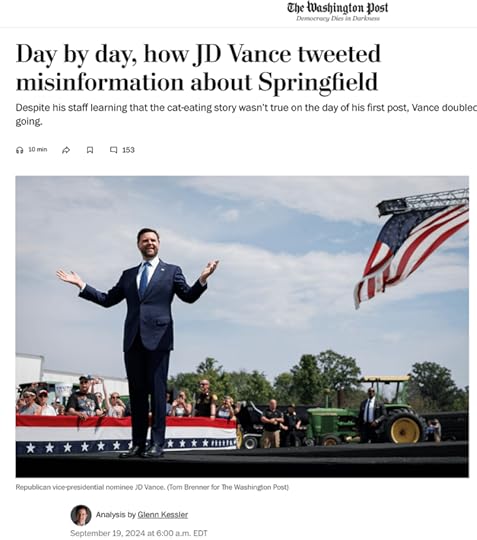
Kessler dutifully quotes every Vance statement at length and then pulls the threads of his ugly sweater one at a time until he ends bare-chested. But once more, Kessler does not provide the context that matters. It barely matters what lie Vance and Trump use as the vector of their hate. The pets aren’t the point. It is blood libel. That is left unsaid.
Damn.
There are exceptions. Many a day, Jennifer Rubin is to The Post as Jamelle Bouie is to The Times: welcome relief. Ruth Marcus, too, is better than most. But even she finds herself trapped, callingSarah Sanders’ awful attack on Harris “a new low for the GOP.” Problem is, it’s hard to get lower than fascist, authoritarian, racist, misogynistic, lying, hateful insurrection.
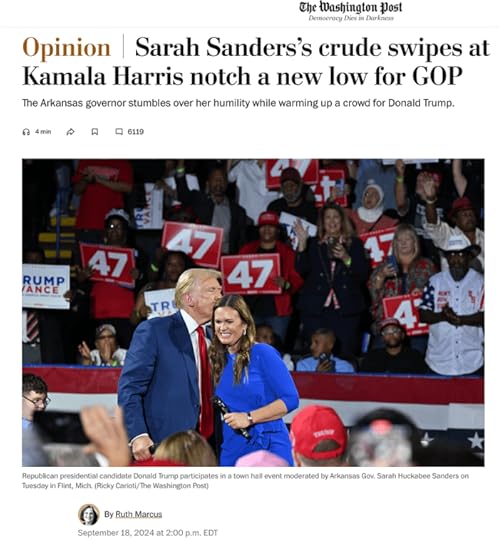
How much better it would be to instead offer readers an ongoing narrative identifying fascism and blood libel as it occurs and pointing to all such instances as further evidence in explanation.
That is what old journalism is doing wrong.
Meanwhile, how are things up the Acela at The Times? As awful as ever.

J.D. Vance’s fascism is “combative conservativism” and his blood libel against Haitians — and, by extension, all immigrants and people of color in America —is “ultra-online political rabble rousing.”
Fuck.
The post How they have failed us appeared first on BuzzMachine.
September 11, 2024
What’s become of The Times & Co.?
As often as I am disappointed in and critical of them lately, I will not cancel my subscriptions to The New York Times or The Washington Post. They should be so lucky, for I will stay on their cases. I also wish to support the good reporting that still comes from them.
I’ve been thinking of calling together some of the papers’ ever-growing cadre of critics for an intervention of sorts, to examine the increasingly troubling performances, ask why we think this has been happening, and suggest what might be done. I want to be hopeful for these critical journalistic institutions. A few weeks ago, I was. Then came disappointment. After the presidential debate, I praised The Times’ coverage and play. Then came disappointment again.
I am one among many citizens and journalists critical of The Times et al. When, in a rare moment of disagreement with Margaret Sullivan, I argued Kamala Harris should not submit to an interview with incumbent national political media, I thought I’d get holy journalistic hell. I didn’t. Only six defensive journalists (I counted) complained; countless more agreed. I’ve suggested to fellow media critics that they are missing the story of their careers: a crush of complaint about these once-venerable institutions, not from the right (which wants to destroy them) but from the left (we only want them to be better).
To be clear, there are many theories about these news organizations I do not subscribe to:
I do not believe that The Times or The Post want Donald Trump elected. Neither do I think they necessarily want Kamala Harris defeated.
Nor do I do believe, as I hear said on the socials, that anyone in these newsrooms is in the pay of Russians, Republicans, or other nefarious forces. Neither do I think that the owners of these publications — even the malign Rupert Murdoch — are daily dictating assignments or headlines, though at a higher level they do bear responsibility for their direction.
Finally, though it’s true that the attention economy — born in mass media and imported online — values attention, thus conflict, I don’t think believe the quality of political coverage is purely the product of clickbait and greed: nothing so obvious.
These are the speculations so often expressed in frustration and anger on social media in response to the latest missteps by these once-august publications. I understand that.
But it would be a mistake to fall into such pat conspiracy-theorizing, for that misses the deeper questions about the subtle and insidious effects infecting the culture of these large, national newsrooms — while giving the defensive denizens of those institutions an easy excuse to dismiss legitimate criticism of their work, for example:
The number of high-status posters who think the New York Times is out to get Kamala Harris is a bit disturbing tbh.
— Nate Silver (@NateSilver538) September 2, 2024
I do wonder what the hell is happening at these newspapers, for it has been — to use Silver’s word — disturbing. I won’t try to catalog all their lapses, sins, and offenses here, for I do that every day now, lately using the hashtags #BrokenTimes, #BrokenPost, and #MurdochJournal to aid in gathering them. The symptoms are self-evident: bothsidesing asymmetry into false balance, normalizing extremism, sane-washing — or worse, ignoring — Trump’s obvious debilitation, downplaying the imminent peril of fascism, putting themselves at the center of this story over the people most at risk, and most recently completely missing what I think could be the biggest political story in a century: the rise of a grand coalition to save democracy. I could go on. I do go on, day after day, so much that I dread opening the pages of these publications most mornings.
Are there exceptions? Absolutely, there are. There is still excellent journalism coming out of these newsrooms (and I will try to label examples of that with the hashtags #GoodTimes and #GoodPost). That there are many experienced and caring reporters in these places is what makes this discussion worth having.
I even see some caring journalists share public criticism of the state of news in subtle subtweets or what can appear to be hostage videos, given that they are muzzled by newsroom rules against self-criticism of their companies. Since the ombudsman has been made extinct in those newsrooms, I very much value these perspectives.
What I do not know is why all this has been happening. I have no inside knowledge. Even so, we need to discuss possible causes to have any sense of how we got here and what — if anything — might be done about it. Either that or we decide that it is too late, that we must abandon these incumbent institutions and move to replace them.
Theory: IndependenceOne theory I keep coming back to is one that Jay Rosen first posited in 2018, examining the impact of an important shift in the economics of The Times from majority support by advertising to majority support from subscribers. “The readers of the New York Times have more power now,” he observed.
One might think that should mean The Times would not want to peeve its readers — though it incessantly does. As Jay also noted, “One of the joys of having a subscription to the Times is threatening to cancel it.” Wouldn’t management do everything to avert cancelation? Yet the opposite is occuring: The Times practically dares its readers to leave. Why?
An old journalism trope has it that if you anger both sides of a story, you must be doing something right. (Nevermind that you might also have so screwed up the story that everyone can see it.) But that’s not what’s happening here. That, too, is too simple a thesis.
I have another interpretation: The sixth-generation Times publisher, A.G. Sulzberger, has lately replaced the often-claimed standard of journalistic “objectivity” with his call for “independence.” But independent of whom? Not advertisers anymore; neither political parties nor governments. I theorize he is trying to prove his paper’s independence from its own readers and liberals — who, as I’ve said, happen to be the same people. Pissing them off might be The Times’ way of saying: You don’t own us.
If The Times can argue that it is not a liberal newspaper and can present voluminous bona fides (see the evidence at #BrokenTimes), then its publisher and editors think they are immunized from criticism, whether from journalism professors or MAGA politicians.
Theory: One size fits allAnother theory holds that to be a liberal newspaper is bad for business, driving away half the market. That argument might have been valid in the day of monopoly metro newspapers, but for these national publications, it’s sophistry. We know full well that Murdoch acolytes watching Fox News are not and never will become Times readers. In this post, I quote Marty Baron’s memoirs, in which he reported that “by the fall of 2018, the percentage of our digital subscribers who considered themselves somewhat or very conservative was in the single digits, with slightly more than 80 percent ‘very’ or ‘somewhat’ liberal.” He seemed to lament that he couldn’t win over conservative readers. I suggested he should have seen this data as a gift: By knowing the community one is serving, one knows how to better serve them. That does not mean pandering to their beliefs. It just means the newsroom — and especially the editorial page and its columnists — can stop trying to suck up to right-wing extremists.
Theory: Death to the massI have another theory altogether, one that has been animating my work in the last decade. It’s about the death of the mass media business model, with it mass media, and with it the idea of the mass. That was the book I set out to write that became The Gutenberg Parenthesis. I had begun to write about sociological theories of the mass but decided I wasn’t ready (it became the kernel of a chapter in Gutenberg entitled “Death to the Mass”). I realized I needed to examine the origins of the mass, which meant studying the birth of print. Hello, Gutenberg.
I next wrote Magazine a small (and fun) book about the long century of the magazine as a way to explore the arc of the long century of mass media. I’m now writing a book called Hot Type about the Linotype and the mechanization and industrialization of print it heralded — and thus the dawn of mass media.
Today we come to the dusk of mass media (that’s the next book I want to work on). Its assassin is the internet, which enables any and all to publish to the world, obliterating mass media’s control over the scarcities of voice in the culture, and robbing publishers — in their perspective — of the pricing power they held over those who wanted to reach the mass, whom publishers and broadcasters thought they could own.
That, I think, could be one cause of what we are seeing happen in The Times, The Post, The Journal, network news, and other national news media. They cannot stop believing it is their mission, even their birthright, to serve and sell to everyone — the mass — when everyone now has more choices to go to. They hate that they no longer control access to audience, attention, authority — and advertising — and resent their replacement by digital startups, bloggers, social media, so-called influencers, the technology companies that enable them, and the masses themselves.
Ironically, I believe that the overarching story mass media are failing to cover at all adequately — the rise of American fascism in the body of white, christian nationalism — is fueled by the Trumpists’ explicit fear of “replacement.” Trump’s insurrectionists would sooner burn the fields than share the nation’s bounty with those who have built it.
The reaction inside journalism is not insurrection. It is the opposite: defensiveness, circled wagons, retrenchment, refusing to hear or dismissing criticism and denigrating critics, and finding others to blame for their problems — often, the internet.
I address that in my new book out next month, The Web We Weave. I began the book intending to write a defense of internet freedoms, but it became a critique of media’s moral panic over the internet and the impact that is having on those freedoms. News institutions as companies never acknowledge their own conflict of interest in covering what they see as a new competitors on the net.
I see a much larger problem at work: Journalists and news executives — and I include myself in this critique — were never equipped with the tools of theory and history to inform self-reflection on our field and to imagine alternative means and models of serving our publics.
This is why I hold that simply teaching the craft and skills of journalism in journalism schools is wholly inadequate to the profound challenges in our field. Journalists see themselves as producers of the commodity they call content and they define their value according to their roles in that process of manufacture. They would be better served to also learn from the disciplines of media studies, communication, history, sociology, ethics, and others — empowering them to reimagine and reform our field.
When I started teaching journalism myself as a mere practitioner in 2006, I tried to learn from the example of my actual academic friend and mentor, Dr. Rosen, whom I often witnessed standing back from any phenomenon in our discipline to abstract: to ask what is really happening here, and then to examine the implications of the possible answers. I wanted my students to be able to do that as they embarked on careers in a field undergoing profound change, and so I wanted to teach them the theory, history, and economics of journalism (and was given an ever-shrinking timeslot to do so). Of course, that meant I needed to study that myself — thus the many books.
That is what brings me to ask what the hell is happening at The Times, The Post, et al. I do not have an answer, only evidence to gather, abstractions to ponder, theories to explore. I wish to examine these issues with others who are puzzled, disturbed, and disappointed about what they, too, see coming from these institutions … and we are many.
Can these institutions improve? Only if they recognize the need to. Can they be replaced? Yes, but we cannot yet know with what.
I often pull this thick book from my shelf: a directory of every American newspaper in 1900.

The year 1900 was just a decade past the introduction of the last machine needed to complete the industrialization of media (the Linotype — thus my interest in it), and a half century past when the average circulation of a daily newspaper in the country was only 4,000. New York boasted scores of publications serving what we would now think of as market niches — e.g., Finnish sailors — but should instead see as communities. By the turn of the last century, circulations were already rising into the hundreds of thousands, soon to be millions. Mass media were rising.
The value of studying the history of media is that we can learn from alternatives in the past to which we may return: smaller publications at a human scale, serving communities rather than that imagined mass.
That vision of post-mass media profoundly frightens large, national news organizations with their business models built on the goal of selling content to everyone. It also disturbs the proprietors of incumbent local media, now controlled by the hedge funds that are hiring lobbyists to cash in their political capital for protectionist legislation to benefit them over their new competitors.
The Sulzbergers fashion themselves protectors of The Times and, indeed, for generations, they have been. Now The Times needs further protection from the institution’s own reflexes. The Post has been handed over to Murdoch executives and I fear for it. Murdoch himself is trying to exclude his own children from shifting his empire away from his odious, extremist mission. Sinclair stands ready to do the extremists’ bidding. Hedge funds have denuded local news. It is all ominous for the future of what was journalism. And the Financial Times just reported that Leonard Leo, who has bought our Supreme Court, is planning to buy local news media. We are warned.
I cannot tell you what is happening to The Times, The Post, and the rest of incumbent national news media, but I know something is and it worries me. They refuse to acknowledge or reflect on this change, so others must, in the context of history, with the larger mission and role of journalism in mind, and with the hope still that something can be done.
The post What’s become of The Times & Co.? appeared first on BuzzMachine.
September 6, 2024
The unprecedented grand coalition

As Nicolle Wallace exclaimed on her show Friday, Liz Cheney and Dick Cheney, Alexandria Ocasio-Cortez and Bernie Sanders have all gathered together around a cause. That cause is democracy and its standard bearer is Kamala Harris.
This is a momentous time in the United States, unprecedented at least in this century and likely since long before the Civil War. It is the biggest story in my journalism career. The question is whether our national media will understand this moment — or whether they will continue to insist on their trope of a divided America.
It is not a divided America. Patriots are gathering together and putting past differences aside to forestall a next civil war, to support and defend the Constitution. The movement that matters is not Trump’s and the Republicans’ fascist insurrection, which is the one that gets attention in news media. The movement that matters now is this one: the movement for democracy.
In recent days, in The Times, Nick Kristof scolded liberals, telling us why we should not demean Trump voters. A few days later in The Washington Post, Matt Bai rebutted, saying he understands Trump voters but asking why he should give them empathy. I say both framings are wrong, for each centers Trump and his fascists.
A much more profound phenomenon is growing — not on the “other side” of the fascists, but instead at the new and true core of American politics and governance. The question is not whether we should demean or understand or empathize with fascists. What we should be concentrating on instead is welcoming those who will stand for democracy in a larger movement.
Lord knows, I have disagreed with Dick Cheney and Liz Cheney. I will disagree with them still. But I welcome them into this grand coalition that is forming now. MSNBC has its sane and sometimes former Republicans — Nicole Wallace, Charlie Sykes, David Jolly, and, Joe Scarborough — and I welcome them and thank them for standing up for democracy and against fascism, a word they regularly use (though The Times, The Post, et al do not). We must welcome more to this righteous and urgent cause.
For God’s sake, political reporters, stop framing these two movements — one to tear down democracy, one to build it up — as equivalent sides across your imaginary continental divide. Stop your false balance. Stop washing the insanity of the fascist party’s leader — and the insanity of his followers for following him. Stop normalizing his and their patently abnormal and abhorrent behavior. Stop trying to predict (in this unprecedented moment, all your “models” and experience and presumptions are worthless). Stop hoping for bad news. Stop making the story about yourself — yes, I am looking at you, A.G. Sulzberger — and please try to understand the threats to democracy, liberty, and life from the perspectives of those who do not share the power and privilege of your platforms. Stop ignoring the rising chorus of critics who are trying to make you and your journalism better — to save journalism from your lapses of judgment. Stop your amnesia about what Trump and company have already shown us to be. Stop making up new white-gloved euphemisms for racism, misogyny, lies, insurgency, corruption, hatred, and grift — call these things what they are, otherwise you are not doing journalism, not informing and explaining reality to your publics.
Here, right in front of your eyes, is the story of the century and perhaps of the nation’s history. This is your last test. Fail at this, and there is no hope for you. Step up to the moment. Cover the story of your lifetimes.
The post The unprecedented grand coalition appeared first on BuzzMachine.
August 29, 2024
How Murdoch makes a meme
I’ve long said that Rupert Murdoch is the single most malign influence in English-speaking democracy. He executes his strategy in small ways that add up. Here is an example: how a trope is born across Murdoch’s worldwide empire.
Here is the editorial board of #MurdochJournal with its paternalistic, patronizing, sexist, diminishing take on the Harris/Walz interview — or “chat” — on CNN.

Now here is the #MurdochTimes of London with its equally insulting take: Walz as “babysitter.”

Next: the #MurdochAustralian with further diminishment: Walz as “pet”, Harris needing “emotional support.”

Not to be left out, there is the odious Murdoch-owned Sky News of Australia (just as bad as Fox News):

Nevermind the facts. Facts never stop Murdoch & Co. Lots of tickets give joint interviews:

This is just one small exhibit of the Murdoch method. It’s a story that will dissipate like a fart. But it is all additive, like carbon monoxide in the blood with Murdoch’s constant production of poison using his bully pulpits — his term — to drive his agenda. And the rest of media help him:
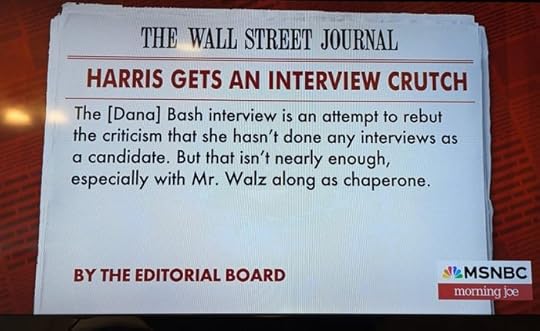
Note well that Jon Lemire disagreed with the Journal. Doesn’t matter. Murdoch’s poison is spread nonetheless.
Murdoch’s newspapers and networks are not news organizations. They are political actors and should be covered by the rest of media as such. But no. Instead, the rest of media help him do his work. This is how it happens. This is how fascism spreads.
The post How Murdoch makes a meme appeared first on BuzzMachine.
August 22, 2024
California’s Deal for News
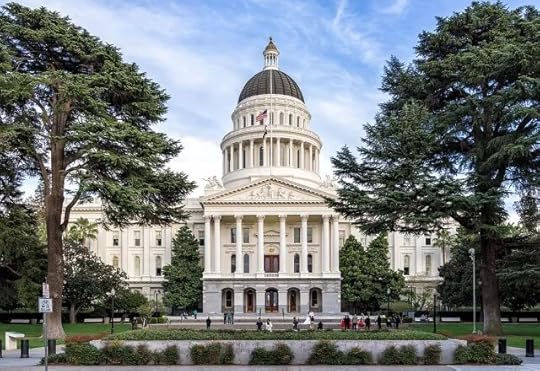
A deal has just been struck in California by Assembly member Buffy Wicks that averts what could have been, in my opinion, disastrous legislation written by lobbyists to benefit primarily incumbent, investor- and hedge-fund-controlled news media in and out of the state.
I am gratified that the outline of the announcement approaches what I had proposed in my research on the legislation, commissioned by the California Chamber of Commerce, and in testimony I gave to a California Senate committee.
The structure of the deal: a private/public fund to support news, overseen by an independent board and administered by a university. I’ve gotten a few more details of the plan and this could well change, but as I understand it, it provides for:
A matching fund for news with $15 million from Google and $15 million in public money in the first year. Years two to five are to be determined but I understand there are floors and ceilings set.The fund is likely to be based on employment (full-time and freelance) in news organizations, which would disappoint me insofar as some money would end up with investor- and hedge-fund-owned newspapers that are cutting more than investing in news. Money being fungible, that money will likely go to their P&Ls rather than supporting more reporting. The fund is to be administered at UC-Berkeley’s journalism school under a board that includes representatives from independent, Black, Latino, and ethnic media and labor. That board will decide such matters as eligibility. Google will have no say in how these funds are distributed.Google will contribute $5 million to seed a separate AI innovation fund, which will benefit news and other sectors. In my testimony, I said it critical for the news and tech industries to work together on this front, now more than ever. Other tech companies will be approached to contribute to one of the funds. OpenAI is quoted in Wicks’ press release. I wish that Meta, Amazon, Apple, Microsoft, and other companies will step up. In the press release, Governor Gavin Newsom also expressed support for legislation that would devote a substantial portion of “official marketing, advertising and/or outreach advertising with local and underrepresented media outlets.” Good.And importantly, Google will continue its support for its News Showcase and Google News Initiative (GNI), with a commitment increasing to $10 million a year. I had feared this support would go away if one of the bills passed. Especially Google has driven much innovation in news and the continuance of the fund in California (unlike Canada) will enable worthy projects (like the WGBH quality news network) to get ongoing support.I would have preferred a fund like the NJ Civic Info Consortium, an independent, nonprofit organization established by legislation to provide grants and support to local news organizations meeting goals for equity and innovation in news, with accountability for outcomes. New Jersey’s fund, supported by public and foundation dollars, is administered by an independent board appointed by universities, the governor, the legislature, and the board itself, working closely with Montclair State University’s Center for Coooperative Media and New Jersey News Commons. (Disclosure: I serve on the Center’s board of advisors.)
The California deal averts many perilous outcomes from the legislation. The two bills that came from California’s Assembly and Senate raised, in my view, constitutional issues — which I discussed in my paper and then here and here — and likely would have been tied up in courts with challenges for years, delaying payment to news organizations.
Worse, Meta vowed that if the legislation passed, it would do what it did in Canada pulling news off Facebook and Instagram rather than being forced to pay for linking to it. As I also outline in my paper, that move has proved inconsequential to the platforms but disastrous to news sites — especially community news sites — that have lost most of their social traffic. Given that there will be no new law in California, Meta will not have an excuse to drop news there. I hope it will not only continue to link to news but will support these efforts. Meta says that because there is no legislation, it will not limit news on the platforms.
There are many questions that can be answered only through experience: who exactly will join the board; how the board will determine eligibility for the funds; and how — if at all — it will monitor accountability.
I give much credit and respect to Wicks. I was quite critical of the first draft of her California Journalism Preservation Act (CJPA) and testified against it. In that hearing, she made clear that she was open to discussion and meant it. She has proved an adept negotiator in bringing many interests — old news and new news in many definitions and technology — together for a rational, logical framework. Not everyone will be pleased. That’s negotiation.
I am especially glad to see that Wicks’ efforts broke a pattern that started in Germany and ran through Spain, the EU, Australia, and Canada, in which legislators under the influence of old-media lobbyists passed bills making demands on tech companies, rather than attempting to find mutual benefit. California shows a new path toward discussion instead. In California, Wicks and her Senate colleague Steve Glazer used their bills as a forcing mechanism to bring Google (and, I hope, other technology companies next) to the table.
Incumbent newspapers and their lobbyists have behaved badly in California as they have elsewhere. The original version of CJPA was written by newspaper lobbyists. It was an adaptation of Sen. Amy Klobuchar’s equally awful federal Journalism Competition and Preservation Act, which was created by the News/Media Alliance (new name for two very old newspaper and magazine trade associations). That bill is thankfully so far stalled in Congress (what isn’t?). I testified against a carbon copy of CJPA that has so far not passed in Illinois.
Newspaper lobbyists always and not surprisingly attempt to benefit their legacy funders to the exclusion of other independent, not-for-profit, Black, Latino, and digital — that is to say, competitive — news media. In New York, unbelievably, a new law creating a tax credit for journalism jobs benefits print — let me repeat that, print — newspapers to the explicit exclusion of not-for-profit and digital local media. How damned 1973 of the Empire State and its governor. There’s a similar effort in Washington State. In California, as I understand it, the local newspaper lobbyist association has held out to get compensated on the basis of jobs (rather than goals and outcomes); increase its representation on the board; and drastically cut a percentage of the fund that was supposed to be earmarked for underrepresented and small, hyperlocal news media. I am glad that Google now still has funds in its GNI, which it can flexibly direct to those needs.
My glass-half-empty view is that the old, incumbent, hedge-fund- and investor-controlled newspapers — which are primarily responsible for the consolidation and ruin of news in the state — still have too much influence. My glass-half-full view is that the lobbyists did not fully get their way — we know because a few are stomping their feet. That fills me with Schadenfreude.
It should be noted that the newspaper lobbyists had insisted that Canada’s legislation has been a success for journalism. That could not be more wrong (and I write about that in my paper). They also tried to argue that California should get the same dollar amount Canada did ($73m US), but on a proportional, per-journalist basis, the state of California ends up at lest as well off as the entire nation of Canada.
What matters most to me now is that independent, not-for-profit, Black, Latino, underrepresented, community, and digital startup news — that is to say, the future, not the past of journalism across America — must gather together to be heard as a force to counter the malign influence of the hedge funds and investors who are dismantling journalism in every state. There are great groups serving these news organizations, new and old — Local Independent Online News (LION), the Institute for Nonprofit News (INN), Montclair State’s Center for Cooperative Media (CCM), and the Newmark J-school’s Center for Community Media (the other CCM). They need to exert themselves as a force to be heard by legislators whenever the health of local news is discussed.
It is also important for legislators and governors to realize that they need no longer bow down before the proprietors of old, dying newspapers. The L.A. Times — which has been laying off journalists right and left at the same time as its investor owner was arguing that he alone was somehow due more than $100 million in this legislation — now has market penetration in L.A. County under five percent. It does not set the agenda. Publishers no longer buy ink by the barrel; they buy it by the thimble and thus politicians need not fear them anymore. Legislators would do better paying attention to emergent, diverse, community, and digital media in their towns, helping to support that.
I am a Kamala Harris Democrat, but for one paragraph I’m going to sound like a libertarian: I get hives at the idea of government involvement in speech and especially jouranalism. I dislike news organizations of any age or size cashing in political capital and seeking favors from and depending on government — or technology companies — when they are supposed to cover those powerful institutions independently. But given that the discussion about support for local news has already jumped over that hurdle, my interest has been in seeing that the support is done in the best way possible. California’s deal is a step in the right direction. The NJ Civic Info Consortium is another.
The money these funds provide can help but it is far from enough to support the news we need. The same must be said for philanthropy and patronage: never enough. News has to find greater efficiencies and independent economic sustainability, a quest I’ve devoted the last fifteen years of my career to working on. There will be no messiahs — all are false — or easy solutions. Old journalism — our broken national media and our denuded local news media — are likely beyond repair. This is why I came to teach: to help the next generation build a new journalism to serve communities rather than their own interests, to concentrate on value provided to communities, not proprietors’ pocketbooks. If policymakers really want to support news, then support that future.
The post California’s Deal for News appeared first on BuzzMachine.
August 18, 2024
Could a new day dawn at The Times?
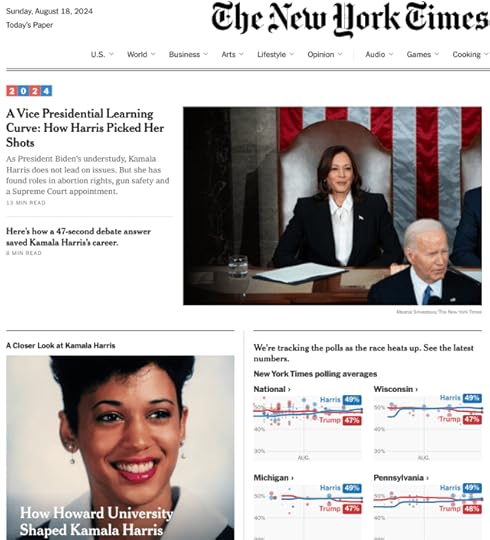
Since I’ve been constantly criticial of The Times and its coverage of the election, here is a thread from the socials in which I note a Sunday morning of positive coverage of Kamala Harris leading the paper online:
Well knock me over with a bald eagle feather: The Times leads today with positive coverage of Kamala Harris. Maybe they recognize the momentum; maybe they want that interview. In either case, I welcome this good & fair reporting.
Elsewhere on the socials, prof-née-Timesman John Schwartz accuses me of “labored parsing of every story and hed” to impute ulterior motive. Isn’t such labored parsing what once made The Times the Times? What I seek is that they recognize what legions of their readers do.
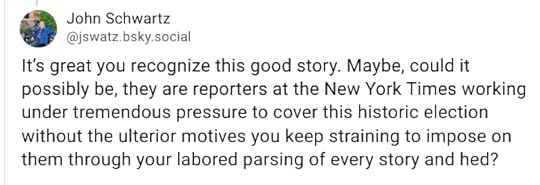
I struggle every day wondering what has happened to The Times; why it does what it does now. Apart from clearly campaigning to oust Biden, I do not impute motives apart from those unfortunately built into our business: a bias for chaos & confrontation, thus attention.
I have wondered whether as a journalist and prof I might overreact to The Times’ failures — but then I see what legions of readers (apart from a few defensive journalists) say, agreeing with and amplifying my criticism. They see it, too. If only The Times would.
It is my fondest hope that The Times listens and learns, for we need it to be better. Note I never threaten to cancel my subscriptions to The Times (and the faltering Post). They should be so lucky. No, I will stay on their ass, expecting better of them.
You might say I’m complimentary of The Times now because it’s complimentary of Kamala Harris, whom I support. No. Its reporting backs up its presentation & there is fair criticism in it. What strikes me is how The Times could see no positive light on the left. Today it does.
Now I can only hope that as the election draws nigh, The Times will also do a better job of seeing and reporting on the fascist storm yet threatening on the right. That is my greater criticism and I’ve yet to see constructive change there.
With profound regret, I’ve declared The Times broken. Can it be fixed? I don’t know. And it is not alone. The incumbents of mass media are failing & falling. One advantage is that I am taking to reading more sources every day.
I read The Times & Post but also now others (without paywalls): The Guardian, of course, plus the Sun-Times, The 19th, Talking Points Memo, The Grio, SF Standard, and others. It is time to support such new and independent journalism.
Note well that I do not speak alone. See the quote tweets and responses to my thread suggesting Kamala Harris should bypass incumbent mass media to speak with new and independent media.
I should add that in The Times, it takes three to make a trend, so one day does not a trend make. I am happy to note a good day and hope for more. We have 80 days to the election, so we shall see….
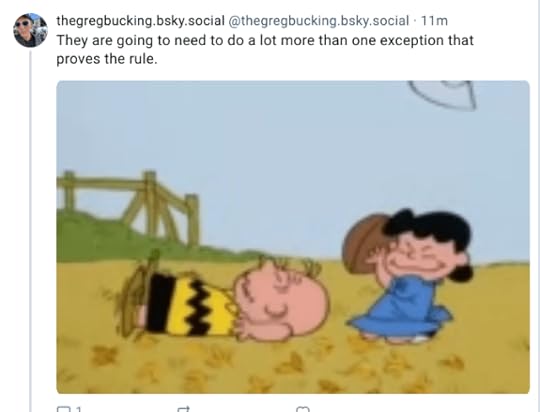
The post Could a new day dawn at The Times? appeared first on BuzzMachine.
August 13, 2024
What ‘Press’?
Margaret Sullivan — whom I greatly respect and with whom I almost always agree — wrote a Guardian column asserting that “Kamala Harris must speak to the press.” Go read it first.
I disagree. That resulted in a thread on the socials I duplicate (with mended typos) here:
What “press”? The broken and vindictive Times? The newly Murdochian Post? Hedge-fund newspaper husks? Rudderless CNN or NPR? Murdoch’s fascist media? No. She can choose many ways to communicate her stands with others outside the old press and with the public directly. The old press can and should be bypassed.
Look at the press’ behavior. When given a chance to ask questions, they sound like they’re in a lockerroom, seeking quotes, not policy. This does nothing to inform the electorate. I know the argument about testing a candidate. But the press as currently configured aims for game & gotcha.
Job 1 is to inform the electorate about policy and stakes. That is up to the candidate to communicate and voters to judge. The press is unnecessary in that process. It can still analyze all it wants. But its questions will do nothing more to inform.
If Harris preempts interviews with the hostile press — which includes not just Fox but now The Times and Post — and goes for an interview on MSNBC she’ll be accused of seeking softballs. (Not that Trump didn’t just get a BJ from Elon Musk…)
The next question is one of character. There we would learn more from seeing Harris and Walz sit down with Howard Stern (his interview with Biden was stellar and revealing) or late-night hosts (Colbert, not for God’s sake Fallon) or podcasters.
What I most want to see Harris & Walz do is bypass old, white mass media (run by people who look like me) and enter into conversations — scarce time allowing — with Black & Latino press, podcasters, community press, thereby validating their role over the priviledged & powerful incumbents in political discourse.
I’ll say this again: The press needs Kamala Harris. Kamala Harris doesn’t need the press. Their motive in whining for what they take as their birthright (hello, A.G.) is to salve their editorial egos and earn them attention (and money). They have not earned this role; they have forfeited the privilege by their behavior.
I agree with Margaret almost always. But here, not. It is time that we as media critics face head on how broken the press is. It does not perform a constructive and productive role. To the contrary, it has been damaging to democracy. Facing the press is not a proper test. The press fails its tests.
It is also critical that we as journalism educators enable our students to break free of the failures of incubment, white, mass media and build a different future for journalism, paying reparations for the sins of media past & present, listening — truly listening — to the public they serve.
As evidence of why I respect and admire Margaret so, this is her tweet in response to mine:
Share the criticism, @jeffjarvis once told me, so here’s his of my new column. He might be right! https://t.co/hOzfUhGDct
— Margaret Sullivan (@Sulliview) August 13, 2024
The post What ‘Press’? appeared first on BuzzMachine.
July 24, 2024
White voters heard here

On MSNBC this morning, I watched Elise Jordan’s focus groups from Green Bay, Wisconsin — the first after the nomination of Kamala Harris. I was honestly shocked that, after the start of this unprecedented presidential campaign by a Black and Asian-American woman, the first voices we’d hear would be from Trump voters. The next group was “right-leaning swing voters.” I was all the more shocked that all the voters in both groups were white. I debated whether to sermonize on this offensive lapse of judgment but instead went light, posting screen grabs of both groups on the socials and asking who might be missing. Enough said, I thought.
Then I got a Twitter DM from Jordan:
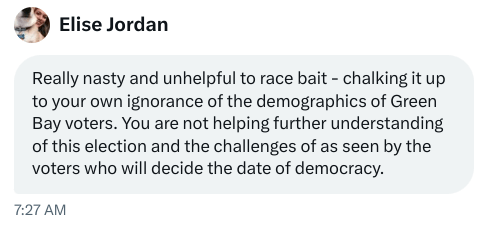
This was terribly upsetting. Race-baiting? For pointing out the complete lack of diversity in her focus groups? I responded:

Having been accused of ignorance of Green Bay demographics, I looked them up.
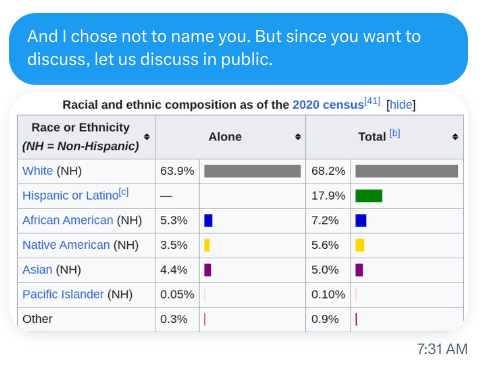
She responded:

I replied:

I thought she might back away from the keyboard, but she did not. She escalated.

Morons like me. Dooming democracy. I didn’t want to see this escalate further. I should have replied, “Bless your heart.” Instead I just said:

There it ended. I’ve given this a few hours to settle but I cannot ignore it for a number of reasons.
First, I depend on MSNBC. I’ve lamented that The Times is broken, The Post has been invaded by Murdochians, CNN and NPR are scared and rudderless, Murdoch’s media are victorious with Sinclair on their side, newspapers are mostly in the clutches of hedge funds. We need MSNBC, now more than ever, as the sane network, not afraid of at least speaking with a liberal and diverse public. It is honestly all I watch all day (other than HGTV). But after the MSNBC post-Trump-shooting and Ronna McDaniel debacles, we need to hold to account the executives in charge of the network — executives from a corporation that, as one insider schooled me, “is a Republican company.” My post was my way of saying: I’m watching, MSNBC. Do better.
Second, I have written in my book, The Gutenberg Parenthesis, about the damage to public discourse done by public-opinion polling as well as focus groups, which I’ll quote:
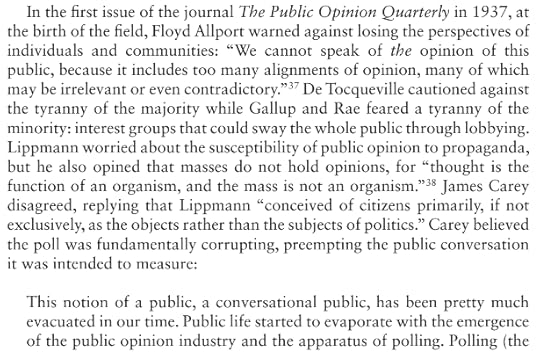
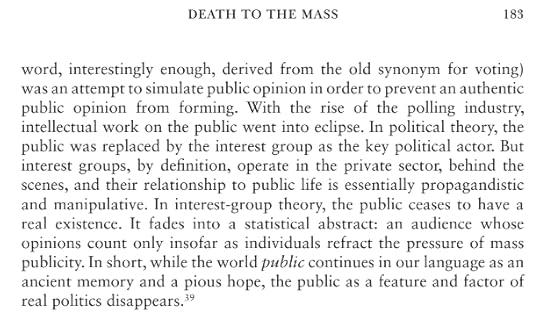
Jordan’s focus groups are all-too-appropriate exhibits for what is wrong with these means of appearing to listen to the body public while instead revealing more about the worldviews of those who pose the questions.
Choosing to lead this first day of focus groups with Trump and “right-leaning” voters showed the judgment of Jordan and her producers. In this unprecedented moment, I’d far rather have heard from some of the 44,000 Black women who gathered on Zoom this week, for they the ones who will decide this election. To lead with white, conservative voters was an explicit choice. It was bad news judgment and a slap to MSNBC’s audience. And there is no transparency into how these individuals were selected.
Jordan’s first question to the Trump voters was whether the nomination of Harris changes the odds of Trump winning. “Everybody’s excited about it and that scares me,” one of the women said. One woman volunteered of the Vice President, “I think she’s an idiot.” To which Jordan asked, “Why do you think she’s not that bright?” And the answer: “Because she hasn’t done anything… she’s not real smart.” Another piped in: “No one respects her.”
None of that is surprising: Trump voters don’t like Kamala Harris. No news there. Wasted airtime. What is surprising is that Jordan only opened the door for further insult.
In what was shown to us, Jordan did not ask them about their own candidate’s intelligence, felonies, sexual predation (this was a group of women), and evident dementia. She did not press them on what they know about the Vice President, only their bad opinions of her.
Next came the so-called swing voters. I am on record doubting that undecided voters are undecided; my theory is that they like attention, such as this. Jordan’s first question to them was to share one concern about Trump and one about Harris — not a positive characteristic of either, but leading with the negative.
“Who do you blame for President Biden’s being in office in this condition?” Jordan asked the group. “Who deserves the blame?” Hang that in the museum of dead journalism, in the collection of leading questions.
One of the participants followed Jordan’s lead, spouting a budding conspiracy theory that, as best as I could interpret it, will end up with Biden leaving office entirely before the election. “If she’s willing to hide that kind of information…. Is is it a power grab or…?” Jordan then asked the group whether this calls into doubt the vice president’s judgment. Objection, your honor. Leading the voters.
To sum up, Jordan and her producers picked two cadres of white, conservatives to give MSNBC viewers their first sense of voters’ worldview in a state and city that Biden won in 2020, if narrowly, and then asked a series of negative and leading questions about the first Black and Asian American women to run for President.
In Jordan’s attack on me in Twitter DMs, she says that it’s morons like me (how’s that for network marketing?) who doom saving democracy. My assumption is that she thinks it is my obligation to hear the ignorant ravings of people known to already hate Biden and Harris or are quick to come to conspiracy theories about them while admitting that they know little about the Vice President.
I believe strongly that journalism must be better at listening to the public it serves. This is why I helped start a degree program in Engagement Journalism and why I am working to expand its reach to more universities. Focus groups and opinion polls are not exercises in proper listening. They are about promulgating the views of the pollsters and about sequestering people into their stereotypes. Indeed, Jordan’s focus groups are, if anything, unfair to the voters they portray by selecting extreme caricatures of Heartland citizens and setting them up for ridicule.
I am empathetic to them for what media does to them — and today’s focus groups are an example. If we are a divided nation, it is media that divides into its demographic and psychographic buckets, red or blue, robbing us of all of nuance and intelligence and reducing public discourse to gotcha bites.
Said one self-reported Trumpist on Twitter in response to the photo of the Trump group above:

Another apparent Trumpist:

An independent:

A lifelong Democrat opined:

And a self-identified centrist independent offered:

At the end of the day, that is the issue: Was this in any way informative? Is public discourse better off for it? Are voters themselves more informed because of it?
Here’s what a journalist I greatly respect said in response to my tweet:

Here’s the video. Is this journalism? Or am I a moron? You decide.
The post White voters heard here appeared first on BuzzMachine.
July 13, 2024
In mass media’s death throes
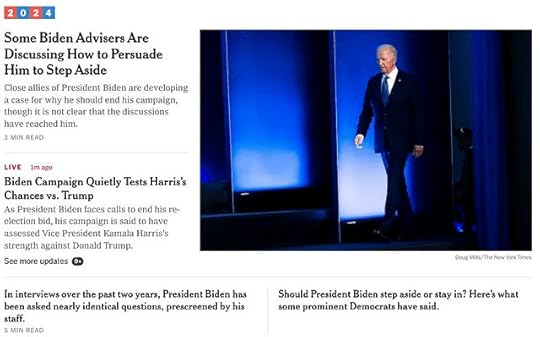
The New York Times et al wish Joe Biden would go gentle into that good night. I wish mass media would instead. Here is a post from a thread:
In this defensive New Yorker reaction to Joe Biden (finally) criticizing the press that has been criticizing him, Jay Caspian Kang shares an important insight about the falling power of the press. But I come to a different conclusion.
Kang says that media are weakened and that’s what makes it easy for Trump and now Biden alike to attack them. I say what it shows instead is that as media realize they have lost the ability to set the agenda, their response is to shout louder and more often. That is what we see every day in The New York Times.
In The Gutenberg Parenthesis, I chronicle — nay, celebrate — the death of mass media and the insult of the idea of the mass. Kang makes me see that I next need to examine mass media’s behavior in their death throes. They are not accustomed to being talked back to, by their subjects or by the public. They respond with resentment. They dig in.
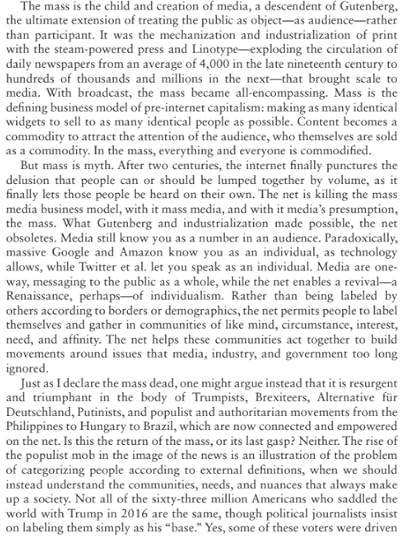
Journalists have never been good at listening. That is why Carrie Brown and I started a program in Engagement Journalism at CUNY (now moving to Montclair State): to teach journalists to listen. In all the wagon-circling by The Times’ Kahn and Sulzberger, The Post’s Lewis, The New Yorker’s Remnick, CNN’s Zaslav, we see a failure from the top to listen to and learn from criticism.
Kang likens Trump/right-wing and Biden/liberal press criticism but they could not be more different. Trump et al want to destroy the institutions of journalism, education, and government itself. Biden and liberals wish to improve the press. We are begging for a better Times. But The Times can’t hear that over the sound of wagons circling.
As I also write in Gutenberg, we find ourselves in a paradoxical time when the insurrectionists formerly known as “conservatives” try to destroy the institutions they once wished to conserve, putting progressives in the position not of reforming but instead of protecting those institutions.
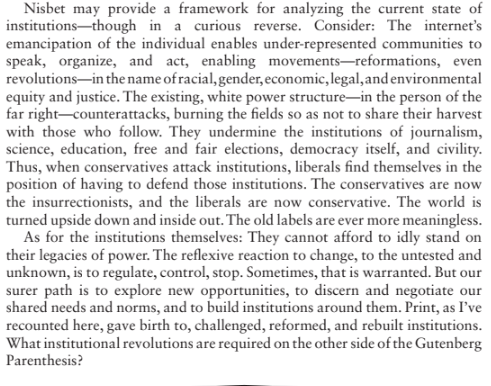
When I criticize The Times —and Kang quotes me doing so — it pains me terribly, for I have devoted my life to journalism and long held up The Times as our standard. No more. It is failing journalism & democracy. I fear the incumbents may be beyond reform & require replacement.
By the way, the incumbents of journalism know this. That is why they invest in lobbyists to pass legislation in New York, California, Washington (State and next DC), Canada, and Australia to benefit themselves at the expense of the media — community, nonprofit, startup, digital — that would replace them. More on that another day.
So I am glad that Biden is finally criticizing The Times and its mass-media peers, if not yet by name. I am glad he rejects the fair-weather platformed pundits, moneyed executives (corporations), and elites (Clooney) who reject him now. In trying to dismiss him, they only make him more progressive.
The New Yorker headline over Kang’s column calls Biden’s criticism of the press “cynical.” It is anything but. It is an overdue and proper response to the cynical exercise of — as Kang makes me understand — the dying power of The Times et al. No one elected Sulzberger, Kahn, Lewis, Zaslav — or Remnick — to run the nation. Millions of us voted for Biden to do so.
Some on the socials insist that The Times etc. want Trump to win. I’ve said that is a simplistic conspiracy theory. I’ve thought they want chaos: something for them to cover. Now Kang makes me think instead they want to recapture their lost agenda and influence: their power.
Kang closes: “If Biden believes he is the last chance for democracy in America, perhaps he should start acting like it.” That should be said of those in charge of America’s legacy mass media: If you think you can save democracy, then start acting like it.
The post In mass media’s death throes appeared first on BuzzMachine.
July 4, 2024
As complicated as Black and white
Here are two attempts to redraw the binary political taxonomies of today:
In the FT, Gideon Rachman argues that after the “liberal false dawn” of Obama, “In the US and France, centrists and liberals are in full panic mode. Nationalist populism now looks like a permanent feature of Western politics, rather than a temporary aberration. The old left-right divide of the 20th century has given way to a new cleavage between liberal internationalists and populist nationalists.”Yet he offers a balm for the nerves: “But liberals should not panic. Dismantling American or French democracy would be no simple task. The hopes of a decisive victory over nationalist populism — stirred by Macron and Obama — proved to be an illusion. But the fears of a decisive defeat for the liberal, internationalist cause are also probably exaggerated.” I’ll have whatever he’s taking.
 In Die Zeit’s new political Feuillton, Thomas Piketty contends to Nils Markwardt that the center is kaput (or kaputt if you prefer the German original) and that — at least in Europe — the only solution is to pit farther left against far right. “A return to the bipolar left-right system will take time, but it is absolutely necessary if we want to restore trust in democratic institutions and enable political change.”
In Die Zeit’s new political Feuillton, Thomas Piketty contends to Nils Markwardt that the center is kaput (or kaputt if you prefer the German original) and that — at least in Europe — the only solution is to pit farther left against far right. “A return to the bipolar left-right system will take time, but it is absolutely necessary if we want to restore trust in democratic institutions and enable political change.”Markwardt continues (with help to me from Google Translate): “In doing so, Piketty is following, whether consciously or unconsciously, a concept of politics that was recently shaped above all by the Belgian political scientist Chantal Mouffe. Her core thesis is that politics is always antagonistic, it consists of the clash of different world views and programmatic contradictions that can never be completely resolved. Wanting to resolve these contradictions in a ‘third way’ or a ‘new center’, as Tony Blair or Gerhard Schröder promised before Macron, is a mere illusion. Because in the end this only creates a feeling of post-political lack of alternatives among the majority of voters, which in turn increases the need for real alternatives — from which right-wing extremists in particular benefit.”
I’m not sure how either applies to the American two-party trap we are in. In The Gutenberg Parenthesis , I assert that roles of right and left are inverted: Conservatives no longer conserve but now seek to destroy institutions as insurrectionists, putting progressives in the position not of reforming institutions but instead protecting — conserving — them.In all of this, it is clear to all that the old labels of right and left are useless.
The too-often-unspoken truth of what is happening everywhere but especially in the US centers on racism. That is occasionally touched on in pieces such as these — as the Europeans grapple with immigration — but it must be seen as the central factor. In the American election, that means that the Democratic Party steamrolls past its Black vice president and ignores the Black voters who saved us in 2020 at its and democracy’s mortal peril.
In the US, the taxonomy needs to be seen as white “Christian” nationalist vs. Black and liberal coalition (I hope).
In Gutenberg, I suggest that “the internet’s emancipation of the individual enables under represented communities to speak, organize, and act, enabling movements — reformations, even revolutions in the name of racial, gender, economic, legal, and environmental equity and justice. The existing, white power structure — in the person of the far right — counterattacks, burning the fields so as not to share their harvest with those who follow. They undermine the institutions of journalism, science, education, free and fair elections, democracy itself, and civility.”
In the US, the taxonomy that informs is Black and white.
It is no coincidence, then, that the two dissenters from The Times’ rush to guillotine Biden are Black men — see Jamelle Bouie and Charles M. Blow — and the lone supporter of Kamala Harris as a substitute is a Black columnist, Lydia Polgreen. In his immensely practical argument, Bouie said:
I have noticed that only a handful of calls for Biden to leave are followed by “and Vice President Harris should take his place.” More often, there is a call for a contested convention. But why, exactly, should Harris step aside? Why should Harris not be considered the presumptive nominee on account of her service as vice president and her presence on the 2020 ticket? And should Harris be muscled out, how does this affect a new nominee’s relationship with key parts of the Democratic base, specifically those Black voters for whom Harris’s presence on the ticket was an affirmation of Biden’s political commitment to their communities?
Blow speaks similarly:
Yet if Biden did stand aside and Harris was passed over in favor of another candidate, there would very likely be strong protest from her legions of Democratic supporters, many of them Black women, a voting bloc that is essential to a Democratic victory.
On top of that, a free-for-all selection process would be sheer chaos. Factions would fiercely compete, egos would be bruised and convention delegates would select a candidate, effectively bypassing direct participation by Democratic voters.
All the while, a mob of white columnists, editorialists, reporters, and commentators rush past them, proposing various white substitutes for Biden, giving glancing mention to the Black vice president. This is how the Democrats will lose democracy, by not at last facing the centrality of race.
The post As complicated as Black and white appeared first on BuzzMachine.
Jeff Jarvis's Blog
- Jeff Jarvis's profile
- 133 followers



